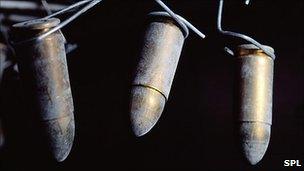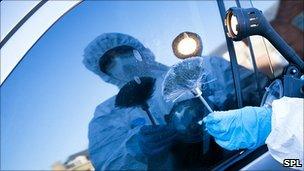Forensics 'safe in private hands'
- Published

The FSS has been analysing more than 120,000 cases each year.
The closure of the Forensic Science Service should have no negative impact on criminal justice as long as the wind down is properly handled, commercial providers have told a Commons inquiry.
LGC Forensics, the biggest commercial provider, said the private sector was ready to take on the work of the FSS, but expressed concern that the forensics market was shrinking.
The government announced last year that the FSS would close, with as many of its operations as possible being transferred or sold off.
The government wants private enterprise, which currently makes up 40% of the market, to fill the gap left behind by the FSS.
But some experts are concerned that an over-emphasis on profits could threaten the quality of science.
The FSS analyses evidence from crime scenes in England and Wales, but has been losing about £2m a month.
In a written submission to the inquiry, external, Steve Allen, the managing director of LGC Forensics, commented: "The closure of the FSS will not damage the prospects for forensic science in the UK so long as its wind-down is properly implemented and is used by the government as an opportunity to support a properly regulated market of a sufficient size to enable competition between dedicated market participants."
Market shrinkage
The Home Office has tasked the National Policing Improvement Agency (NPIA) and the Association of Chief Police Officers (ACPO) with managing the gradual wind down of the FSS.
Written evidence, external from David Hartshorne and Roger Derbyshire, directors at commercial provider Cellmark, said there would be no negative impacts on the quality or impartiality of forensic evidence.
"Forensic scientists in the private sector have exactly the same motivation to support the criminal justice system and the victims of crime as those in the public sector," they said.
"[Private sector scientists'] ethics and impartiality are independent of the organisation for whom they work; and ultimately, when they stand in the witness box to provide evidence, they are representing themselves rather than the company that employs them."
In a written response to parliamentary questions on 1 February, Crime Reduction Minister James Brokenshire said advice from ACPO, Her Majesty's Inspectorate of Constabulary (HMIC) and others suggested that the UK forensics market would contract from £170 million in 2009 towards about £110 million by 2015.
In addition, police forces have been bringing forensic work in-house, in order to make cost savings. And commentators say this could pose an impediment to the future expansion of the private forensics market.
New technologies
Some forensic scientists have expressed dismay at the FSS's closure, voicing concerns about the quality of science, the retention of expertise and the future of forensic research and development (R&D) once the service is closed down.

Private companies say the closure of the FSS need not damage forensic science
In a letter to New Scientist magazine in January, Professor Alec Jeffreys, who pioneered the technique of genetic fingerprinting at the University of Leicester, said the decision to close the FSS could not be in the interests of justice.
"Who will provide the expertise for complex and interdisciplinary investigations, and who will develop and refine new technologies? The private sector is most unlikely to fill this void," he wrote.
As reported by BBC News last month, Peter Gill, professor of forensic genetics at the University of Oslo, said there was a mismatch between the government's aim to commercialise forensic science and the requirement of courts for openness.
He added that UK courts would not accept forensic tests whose details were kept secret due to commercial confidentiality issues, external.
'Robust' advice
Mr Brokenshire has said that the Forensic Science Regulator should ensure that quality standards are maintained. This course is questioned by Prospect union, which represents scientists and engineers, in their evidence to the inquiry.
"Currently the forensic science regulator sits in the Home Office, but... Prospect understands that there are very limited powers and no statutory influence," the union wrote.
It added: "Additional regulatory powers will be needed to ensure that there is a level playing field between police forces and private contractors. It will also be essential to ensure that forensic science practitioners have recognisable and respected qualifications and a professional code of ethics."
Professor Allan Jamieson, director of the Forensic Institute in Glasgow, which is a commercial supplier of forensic services, said there was "no reason to expect that, if properly managed, this market cannot deliver the required service at a fair price".
But he highlighted the need for the involvement of the wider scientific community in UK forensic science to prevent it from becoming isolated.
"It cannot be known whether any provider has met the scientific standard if there is no scientific research to measure the standard against," he wrote in his submission.
"Perhaps properly funding this essential research is the obvious, logical, and necessary step to prevent the feared decline of standards in forensic science."
The FSS is headquartered in Birmingham, with a number of laboratories around England and Wales; it has already closed laboratories at Chepstow and central Birmingham to help bring costs under control. The service previously employed about 1,600 staff.
Paul.Rincon-INTERNET@bbc.co.uk
- Published25 February 2011
- Published19 January 2011
- Published14 December 2010